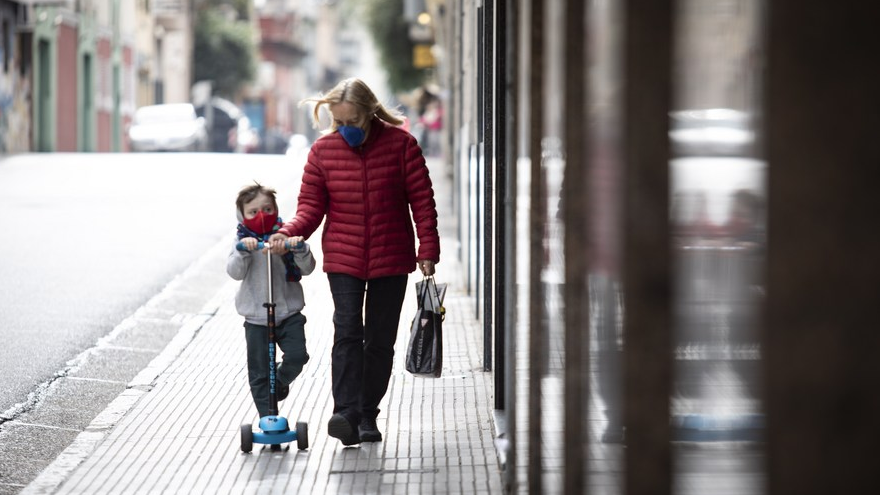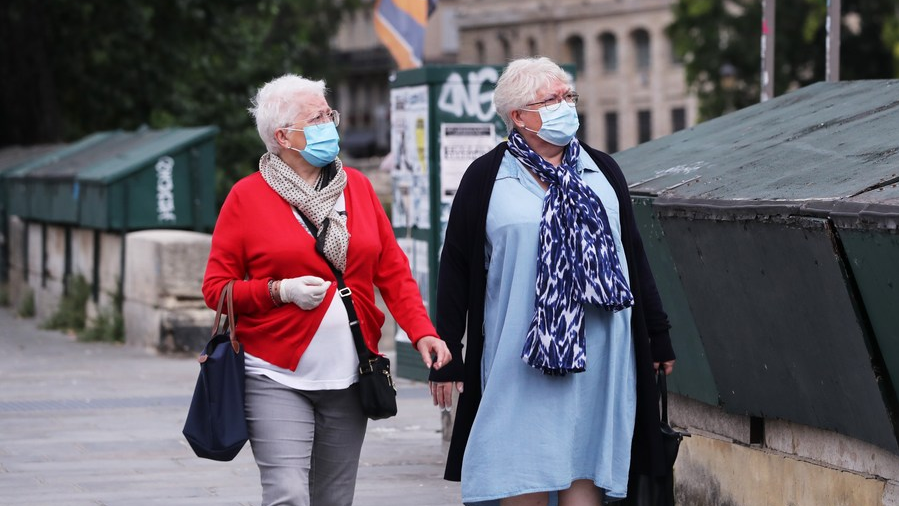
People wearing face masks in Buenos Aires, Argentina, on July 12, 2020. /Xinhua
People wearing face masks in Buenos Aires, Argentina, on July 12, 2020. /Xinhua
Editor's note: Chris Hawke is a graduate of the Columbia University Graduate School of Journalism and a journalist who has reported for over two decades from Beijing, New York, the United Nations, Tokyo, Bangkok, Islamabad and Kabul for AP, UPI and CBS. The article reflects the author's opinions, and not necessarily the views of CGTN.
One of the many unfortunate effects of the COVID-19 epidemic has been the number of people of every nationality stuck far from home due to travel restrictions.
Recently in Dali, Yunnan, where my home is, there have been a series of "everything must go" sales. People plea for new homes for pets. Cars and lovingly tricked-out motorcycles are for sale. Expats unable to return to China are getting their friends to sell everything in their homes, shipping just a few precious possessions like photos and valuable documents.
A typical example of people stranded by the virus are my friends Paul and Kinga.
They were vacationing on a sandy beach on a remote island in Thailand when the epidemic hit. As the death count in Wuhan soared and no one knew what the scope of the crisis would be, they were happy to be outside of China. They felt relief when China beat back the epidemic and largely eradicated the virus.
However, a mandatory two-week quarantine requirement on returning to China seemed onerous and staying in a hotel with people who might be infected slightly frightening.
So they decided to wait a while longer for everything to get back to normal. There was a moment in time when everybody expected things to go back to normal.
Their Thai visas expired, and they moved to a remote tourist village in Indonesia to ride out the crisis. The virus was under control in China, but spreading through Europe and the United States with unexpected speed.
Soon doors started closing in on them, as country after country closed its borders. They were unable to go anywhere, even if they wanted to.
They stayed where they were, in a cabin on a volcanic lake, each day reading the news and trying to make sense of the epidemic and where it was going.
For weeks, they waited for the epidemic to be stamped out, as it had been in China.
Weeks turned into months, and their Indonesia visas expired. The local police told them not worry about it, but anxiety still crept in. Eventually, they received a warning from an embassy official that they might be required to leave the country. The shock made them realize they would have to change their plans.
They bought expensive tickets to Europe, arranged to quarantine at a friend's empty flat, and flew to London, realizing they would not be going back to China – at least not anytime soon. They arranged for a friend to get rid of the things in their apartment.
I was on vacation with Paul and Kinga in Thailand, and I wonder when my Chinese wife and I will be able to return to our home in Dali. It's already been half a year.
Every day we watch videos of our dogs and cats playing, sent by our pet sitter. Our Alaskan malamute weighed 42 kilograms when we left and looks fatter now, kind of like my wife and I. Who would take care of such a big and wolfish animal if we didn't return? And will we ever return to our pre-plague weight?

People wearing face masks walk on a street in Paris, France, July 10, 2020. /Xinhua
People wearing face masks walk on a street in Paris, France, July 10, 2020. /Xinhua
Our housekeeper comes by our courtyard once a week to keep an eye on things. She reports a leak in the roof. I guess the repair will have to wait.
Many foreigners in China imagine they will stay forever, but in truth, most of us will go home one day. Work permits are generally not issued to people 60 and over. China is not set up as an immigration destination – for decades the government's focus was reducing the growth of the population, not growing it. Green cards are reserved for people who have made extraordinary contributions to the country.
When we leave the country, what things of value will we take with us?
Paul told me he is not at all bothered by leaving things behind in his apartment.
"They're only things!" he says. He will miss his e-bike. "We didn't have anything like that when I left UK for China seven years ago. All changed now I suppose."
There are things he is returning home with of greater value.
"I have traveled a great deal around the world but China really opened my eyes. I always say like falling down the rabbit hole into Wonderland. A whole other way of looking at everything! Really everything."
The COVID-19 epidemic is fueling the forces of nationalism and intolerance that were already on the rise across Europe and the United States. The news media, which should be a force for increasing understanding and tolerance in these days, is just as likely to reinforce stereotypes and crush nuance.
It is people like Paul and Kinga who can offer people a more balanced view of the larger world, as people everywhere ask where they belong, and what home really means.
This kind of wisdom and insight cannot be bought or sold at a moving out sale.
(If you want to contribute and have specific expertise, please contact us at opinions@cgtn.com)